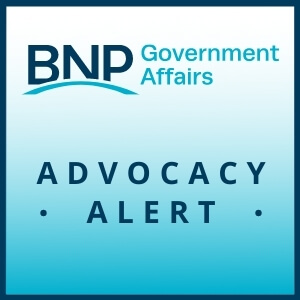8.10.21 Advocacy Alert: Senate Passes Bipartisan Infrastructure Bill
Blog Categories
August 10, 2021

What’s the latest?
This morning, the U.S. Senate passed a bipartisan infrastructure bill that will spend $1.2 trillion in total, including $550 billion in new spending.
The bill passed 69-30, with all Democrats and 19 Republicans voting in favor.
Some Republicans balked at the spending levels in the bipartisan bill, noting that the Congressional Budget Office predicted the bill would add $256 billion to the deficit over the next ten years. Supporters of the bill dispute this, claiming the CBO ignored many of the bill’s “pay for” provisions that finance these expenditures by repurposing existing revenue, not raising taxes.
The bill faces an uncertain future in the house. If the House GOP opposes the bill, four defectors from the 220-member Democratic conference would be enough to sink it.
Additionally, Speaker Nancy Pelosi has repeatedly stated she will not even bring the bipartisan bill to a vote in the House until the Senate passes a partisan budget bill that makes additional social investments. On Monday, Democrats released the budget resolution for this social spending plan, which has a $3.5 trillion price tag.
What’s in it?
The bipartisan infrastructure bill passed this morning includes:
- $110B in new spending on road & bridge repairs.
- $66B in new spending on rail, including Amtrak, Northeast Corridor upgrades, freight upgrades, and rail-highway crossing safety.
- $11B for highway and pedestrian safety.
- $39.2B for public transit system upgrades.
- $65B for broadband deployment and affordability.
- $17.3B for port and waterway improvements.
- $25B for airport runways, gates, terminals, and air traffic control.
- $55B for water and wastewater infrastructure.
- $73B for energy grid reliability and resiliency, and renewable technologies.
- $46B for “resiliency” efforts, including cybersecurity, waste management, and natural disaster preparedness & response.
- $15B for production and infrastructure for electric vehicles and low emission school buses and ferries.
What comes next?
The Senate could vote on the $3.5 trillion social spending package as soon as this week. Democrats need 50 votes to pass it, meaning losing support from any member of their caucus could jeopardize it.
If both bills pass, the House will consider both with votes expected in September. President Biden is expected to sign both bills once they reach his desk.
The BNP has long advocated for a bipartisan infrastructure agreement. Although this bill is imperfect, it provides the funding necessary to address numerous regional priorities.
The Senate’s passing of this bill is a significant step forward, and the BNP applauds Senator Schumer for his leadership on this issue.
The BNP will continue to keep you updated on the infrastructure package and the opportunities it creates.
Related Posts
8.26.21 Advocacy Alert: Hotel & Commercial Conversion Bill Signed Into Law
In the final days of his tenure, Governor Cuomo signed the Housing Our Neighbors with Dignity Act (HONDA) into law. The law aims to convert “distressed” hotels and commercial properties into affordable housing options.
8.24.21 Advocacy Alert: Hochul Takes Oath; BNP Suggests Priorities for First 100 Days
Today, Lt. Gov. Kathy Hochul was sworn in as Governor of the State of New York. The Buffalonian takes the reins after Gov. Andrew Cuomo resigned, amid a storm of bipartisan criticism. Hochul will be the state’s 57th Governor and the first woman to hold the office.
8.10.21 Advocacy Alert: Cuomo Resigns, Hochul to Assume Office
This afternoon, Governor Andrew Cuomo announced his impending resignation, effective in 14 days.
Cuomo’s resignation comes after the Attorney General’s report that detailed sexual assault and harassment allegations from eleven women. After the report, Cuomo received nearly unanimous calls to resign from lawmakers and Democratic party officials. The Assembly Judiciary Committee was also in the process of conducting an impeachment investigation.
8.4.21 Advocacy Alert: Biden Reverses Course, Extends Eviction Moratorium
On Tuesday night, the Biden administration issued a new eviction moratorium – a complete reversal from the President’s assertion this weekend that he lacked the authority to do so.
The new moratorium is in effect through October 3, going beyond New York State’s August 31 deadline. It extends the terms of the original moratorium: tenants cannot be evicted for nonpayment of rent.

